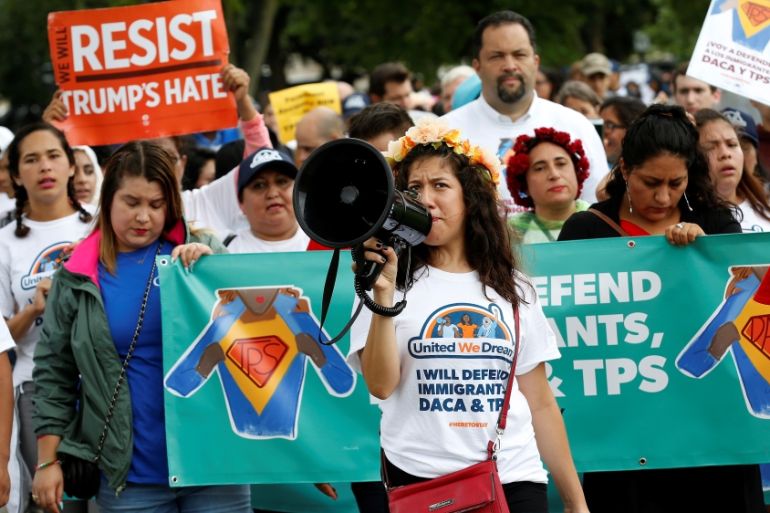US ends protected immigration status for Nicaraguans
Monday’s announcement affects 2,500 Nicaraguans, but grants temporary reprieve to Hondurans who fear they will be next.

The Trump administration eliminated temporary legal residency and deportation relief for thousands of immigrants from Nicaragua.
The decision, announced by Homeland Security Secretary Elaine Duke late on Monday, will affect 2,500 Nicaraguans who have legally lived and worked in the country for nearly two decades.
Keep reading
list of 4 itemsAs South Africa votes, Zimbabwean migrants, smugglers anxious about future
EU signs off on sweeping migration overhaul ahead of elections
Number of internally displaced people hit record 75.9 million in 2023
Duke said that Nicaraguan recipients of Temporary Protection Status (TPS) will remain protected under the visa for another 14 months, until the programme is officially terminated on January 5, 2019.
They will then have to seek alternative ways to gain legal status or prepare to forcibly return to Nicaragua, according to the government memo.
While the move was expected by many, the Nicaraguans affected still find Monday’s announcement shocking, and worry about the prospect of potentially having to return home.
“I am shocked that my government did absolutely nothing to protect us from the elimination of TPS,” Bernan Vusto, a TPS holder since 1990, said.
The 50-year-old, who is originally from Leon, Nicaragua and now lives and works in Washington, DC, said there is a job shortage in his home country that would make it difficult and expensive to return.
TPS is a form of temporary legal residency established in the Immigration Act of 1990 that provides worker visas to more than 300,00 immigrants from 10 countries experiencing ongoing armed conflict, environmental disaster or other circumstances that make it potentially dangerous for them to return to home.
Immigration officials regularly decide whether to renew the programme every six to 18 months for each country.
The Department of Homeland Security (DHS) eliminated the provision for Nicaraguans after determining they no longer needed relief from “substantial but temporary conditions” caused by the hurricane that ravaged the Central American country nearly 20 years ago.
Under TPS, immigrants from Honduras and Nicaragua were granted temporary protected status in 1999 after Hurricane Mitch killed more than 10,000 people and severely damaged infrastructure in both countries.
On Monday, DHS determined that Nicaraguan TPS holders can now return home and said that the Nicaraguan government will adequately handle their return. The department added that the Nicaraguan government had not requested that the programme be extended.
Hondurans fear they’re next
The Trump administration’s plans to create more stringent immigration policies may determine whether the provision is renewed for other countries like El Salvador, Haiti and Honduras.
On Monday, the DHS’ Duke said the administration needed more time to determine whether to renew the visa for Hondurans, saying it will extend the programme until July of next year.
Last week, Secretary of State Rex Tillerson said that the conditions in Central America and Haiti no longer justify the need for protections under TPS in a letter to DHS.
The elimination of TPS protection for these groups would affect hundreds of thousands of people.
According to one study, Haitians, Salvadorans and Hondurans comprise the three largest TPS holders and together have a total of 273,000 children who were born in the US and have American citizenship.
![Demonstrators march to demand the Trump administration protect the Deferred Action for Childhood Arrivals (DACA) and the Temporary Protection Status (TPS) programmes [Joshua Roberts/Reuters]](/wp-content/uploads/2017/08/60260af759a2488d8652ab18251ae0c0_18.jpeg)
While spared on Monday, Honduran TPS recipients say the extension just draws out the fear that their permits will not be renewed.
Guisell Martinez Flores, a TPS holder from Honduras who has worked as a janitor in Los Angeles, California for more than 18 years, said the announcement does not constitute good news.
“I have never been so uneasy as I am now,” Flores told Al Jazeera.
“We have had to renew our work permits constantly but it is different under this administration,” she said.
“They think we are criminals, and the uncertainty is just so overwhelming.”
DHS has called on Congress to enact a permanent solution to resolve the seemingly imminent elimination of TPS in the memo and give options to the thousands of immigrations that are losing or may eventually lose these protections.
But for the 2,500 Nicaraguans, including Vusto, their time in the US may be coming to an end.
“It is possible that Congress might take action in the next 14 months and gives us reprieve,” Vusto said.
“But after the shock of yesterday’s announcement, it’s difficult for me to think about what will come next.”